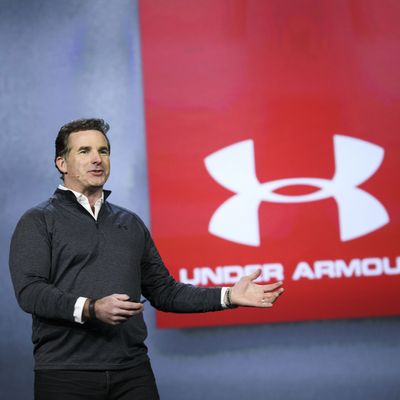
In our political system, the views of city-dwelling millennials matter markedly less than those of senior citizens in small-town America. This is because the latter are more likely to vote, and their votes are more likely to be influential. The Senate and Electoral College give disproportionate power to rural areas — while the tendency of millennials (and other left-leaning constituencies) to cluster in urban centers ends up “wasting” Democratic votes in deep blue congressional districts, thereby diluting their influence in the House.
This goes a ways toward explaining why Congress is controlled by a party that only about 20 percent of 18-to-29-year-olds approve of, while the White House is occupied by a man that two-thirds of the demographic abhors.
But the logic of consumer capitalism provides young urbanites with a consolation prize: While they have disproportionately weak influence over the policies of their government, they enjoy disproportionately strong influence over the messaging of their brands. This is because city-dwelling millennials are more likely to try new products than your average elderly person in rural America — and the former’s brand loyalty is more coveted, since they are less likely to die soon.
The fact that America’s most influential voters — and its most influential consumers — have diametrically opposed political inclinations has put corporate America in a bit of a bind.
On the one hand, companies generally like to stay in the White House’s good graces, since federal policy can impact their bottom lines. And this objective seems especially compelling when the president is a loud-mouthed celebrity who uses his bully pulpit to abrade brands that displease him, and praise those that flatter his self-image.
On the other hand, the best way to alienate the nation’s most desirable consumer demographic is to associate your brand with the embodiment of all that they long to #resist.
In the immediate aftermath of Trump’s election, liberal pundits fretted over the implications of the former incentive. And for good reason: Trump spent his first weeks as president-elect bullying a series of private companies into amplifying his message.
After Trump castigated Boeing for giving the government a bad deal on the new Air Force One, the defense contractor’s CEO praised the mogul’s “business head-set,” and vowed to cut the plane’s production costs. Meanwhile, other companies scrambled to shield themselves from Trump’s protectionist tirades by reframing months-old expansion plans as direct responses to his election.
But in the weeks since Trump’s inauguration, the president’s toxicity with urban millennials (a.k.a. cool America) has proven more salient to marketing departments than the threat of his Twitter tantrums.
This fact was unmistakable on Super Bowl Sunday: When Americans tuned into the corporate-propaganda championships, the message they received was much closer to “Stronger Together” than “America First.”
Whether companies were selling cola, tires, short-term lodging, or terrible beer, all seemed anxious to express their love of immigrants and a multi-ethnic conception of American identity.
Some of these spots inspired talk of boycotts from red America. But, at least from Budweiser’s perspective, the benefits of flattering urban millenials’ political views outweighed the costs. Per Bloomberg:
When the Budweiser brand prepared to release a potentially controversial commercial two weeks ago, its social-media monitoring team got to work.The ad tackled the hot-button subject of immigration by depicting founder Adolphus Busch coming to America in the 19th century, and the company wasn’t sure how customers would react.
So it tracked tens of thousands of posts to see how the commercial was received and took solace when 78 percent of online conversations were neutral or positive. Despite some pleas to boycott Budweiser – misspelled in a Twitter hashtag as “Budwiser” – managers decided they had made the right decision to air the ad.
Days after the Super Bowl, the president established that, for certain brands, his public opprobrium functions as a coveted endorsement. After news broke that Nordstrom had dropped Ivanka Trump’s fashion line, her father scolded the company on Twitter — and its stock promptly increased in value.
Further, some companies that initially struck a friendly stance toward the administration have quickly found such a position untenable. The uproar kicked off by Trump’s travel ban forced Uber’s Travis Kalanick to ditch the president’s business advisory board. Meanwhile, Under Armour CEO Kevin Plank’s praise of Trump was promptly rebuked by consumers; and then by his company’s own celebrity endorsers; and then by Wall Street. This week, an analyst with Susquehanna International Group cut his target stock price for Under Armour from $24 down to $14, explaining that when Plank described Trump as a “great asset for America,” he made it “nearly impossible to effectively build a cool urban lifestyle brand in the foreseeable future.”
None of this is to suggest that much of corporate America doesn’t smile behind closed doors on unified Republican rule. Nor, for that matter, do all brands feel comfortable counter-messaging Trumpism in public.
On November 10, Pepsi CEO Indra Nooyi landed her company on Trumpists’ boycott lists by saying of Election Night, “Our employees were all crying and the questions that they’re asking, especially those who are not white, ‘Are we safe?’ Women are asking, ‘Are we safe?’ LGBT people are asking, ‘Are we safe?”’
Since then, Nooyi has refrained from publicly criticizing the president — while joining his Strategic and Policy Forum.
Still, Trump’s historic unpopularity among the young — particularly those with metropolitan addresses and college diplomas — limits the extent to which corporations can openly partner with his administration.
So, while millennials can’t count on enjoying student debt relief, more affordable health care, stronger workplace protections, or a sane climate policy any time soon, they can rest assured: Trump won’t stop your favorite brands from staying woke.






























